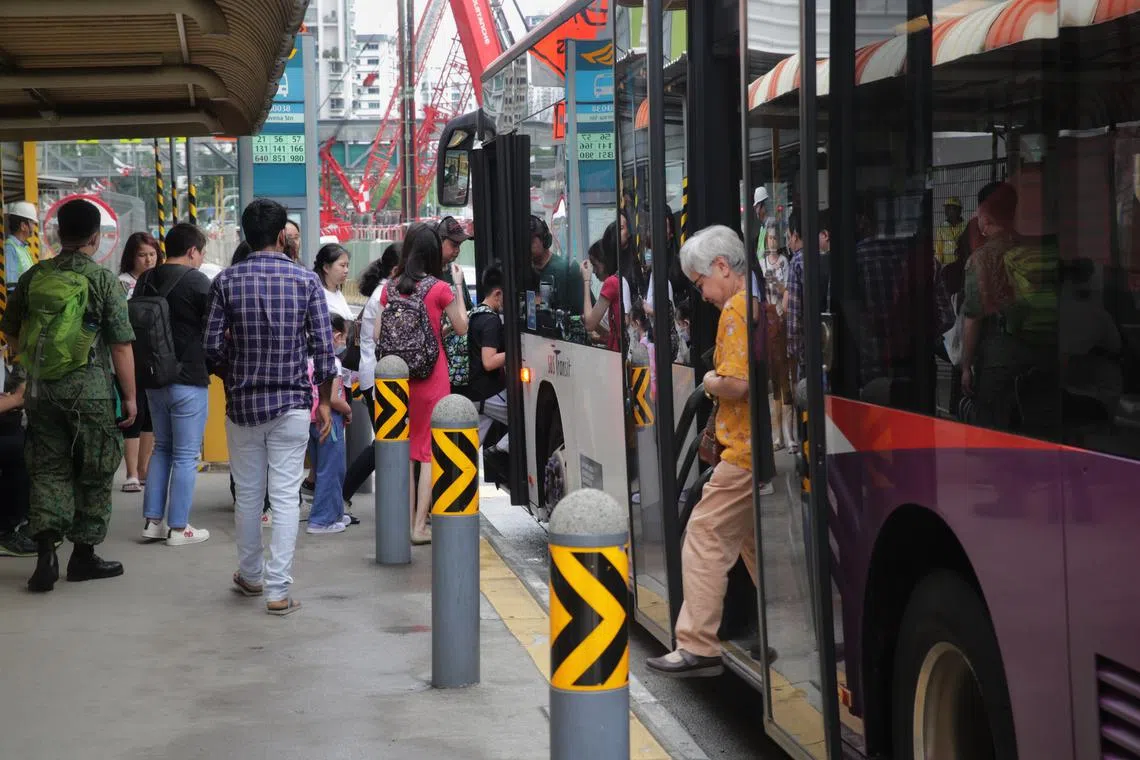Six firms, including 2 foreign entrants, vie for Bukit Merah, Jurong West bus routes
Sign up now: Get ST's newsletters delivered to your inbox

National Express Group and Transdev Group joined in making a bid for 17 bus routes in the Bukit Merah area and 26 around the Jurong West region.
ST PHOTO: GIN TAY
Follow topic:
SINGAPORE - A tender for two public bus packages drew six bidders at its close on Wednesday, including two foreign companies looking to gain a foothold in the Republic.
British transport provider National Express Group and French transport company Transdev Group joined incumbents SBS Transit (SBST), SMRT Buses, Go-Ahead Singapore and Tower Transit Singapore in making a bid for 17 bus routes in the Bukit Merah area and 26 around the Jurong West region.
The two packages, currently operated by SBST and due to expire in 2024, were put up for tender in November 2022.
It is the second time the Land Transport Authority (LTA) has called a tender for two bus packages concurrently under the bus contracting model – a move the authority has said may allow for better value-for-money proposals.
Previously, Tower Transit had won in 2020 the bid to run both the Bulim and Sembawang-Yishun packages, which were put up for tender concurrently as well.
For the latest tender, companies had the option of bidding for the Bukit Merah bus package, the Jurong West bus package, or both.
It is not clear from government procurement website GeBiz which packages the six companies had bid for, or at what price. The Straits Times has asked LTA for comment on this.
SBST, SMRT Buses and Tower Transit had previously signalled interest in bidding for both packages.
In SBST’s annual report for 2022, its chairman Bob Tan and group chief executive Jeffrey Sim had said the company would be putting in a competitive bid with “a strong value proposition”, citing the economies of scale it has as Singapore’s biggest bus operator and the benefits of synergy that come with it.
Meanwhile, there have been signs that Transdev Group has been eyeing a public transport contract in Singapore, with the firm’s senior vice-president in charge of Asia, Middle East and Africa, Mr Thierry Bergero, who is based here, meeting National Transport Workers’ Union executive secretary Melvin Yong in August 2022.
National Express Group declined to comment when contacted.
It is not the first time that Transdev Group and National Express Group have bid for bus tenders in Singapore.
In 2015, Transdev Group partnered with fellow French transport firm RATP to tender for the Bulim and Loyang packages, but they lost out both times.
In 2016, National Express submitted a bid for the Seletar package and also lost.
Under the bus contracting model, which was introduced in 2014 to raise service standards and inject competition, bus services are bundled into 14 packages by geographic area.
With the model, LTA owns all the operating assets and infrastructure, plans bus services centrally and collects fare revenue. Public transport operators bid for the right to run bus services and are paid fees to do so at standards set by the authority.
National University of Singapore associate professor Raymond Ong, who researches transport infrastructure, said the four existing bus operators here have the competitive advantage in the latest tender.
“Being incumbents, they are in a better position because of their manpower, assets and local knowledge. We are also transitioning to electric buses, and the companies have been very heavily involved in the transformation process,” he said.
Singapore University of Social Sciences associate professor Walter Theseira agreed, noting that bus tenders in Singapore have become more price-competitive.
“The main advantage of the incumbents is they are likely to score better on the quality metrics because their promises are more credible, and they do have a better track record locally... In principle, they also can afford to bid more aggressively as they have existing economies of scale.”
Prof Theseira noted that it is also not clear if the present bus contracting model can sustain more than the four existing bus operators.
“The bottom line is that it’s going to be tough for a new entrant to come in, but one that can convince LTA that it knows something about the local operating environment and offers some innovation and the possibility of bringing prices lower will be welcomed,” he added.


